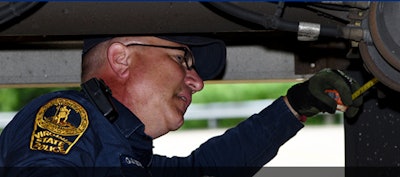
You have 90 days to get your truck's brakes in order.
The Commercial Vehicle Safety Alliance this week announced its annual Brake Safety Week is Aug. 22-28. During that week, enforcement agencies will conduct inspections and remove from the roadways any commercial motor vehicles found to have brake-related out-of-service violations.
Throughout the week, inspectors will conduct North American Standard Inspections of commercial motor vehicles, focusing on the vehicle’s brake systems and components. In addition, inspectors will compile data on brake hoses/tubing, the focus area for this year’s Brake Safety Week.
RELATED: Brake Week: 13% of vehicles inspected in U.S. placed out of service
CVSA says jurisdictions devote a week to commercial motor brake inspections because:
- Brake system and brake adjustment violations accounted for more vehicle violations than any other vehicle violation category, accounting for 38.6% of all vehicle out-of-service conditions, during last year’s three-day International Roadcheck inspection and enforcement initiative.
- “Brake system” was the third most cited vehicle-related factor in fatal commercial motor vehicle and passenger vehicle crashes, according to the Federal Motor Carrier Safety Administration’s (FMCSA) latest “Large Truck and Bus Crash Facts” report.
- Brake-related violations accounted for eight out of the top 20 vehicle violations in 2020, according to FMCSA’s Motor Carrier Management Information System.
- During last year’s Brake Safety Week, 12% of the 43,565 commercial motor vehicles inspected were placed out of service for brake-related violations.
The CVSA says the dates for Brake Safety Week are shared in advance to remind motor carriers, drivers and commercial motor vehicle mechanics/technicians to check and service their vehicles to ensure every commercial motor vehicle is safe, mechanically fit, and compliant. Recent research has shown that announcing enforcement campaigns ahead of time improves overall compliance better than surprise enforcement campaigns and for longer periods after the event, according to CVSA.








